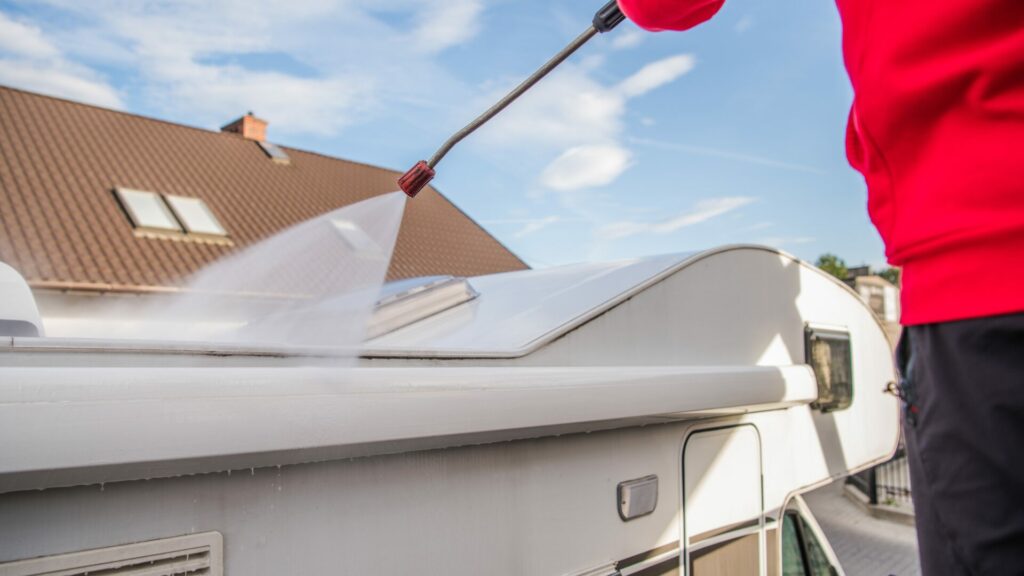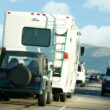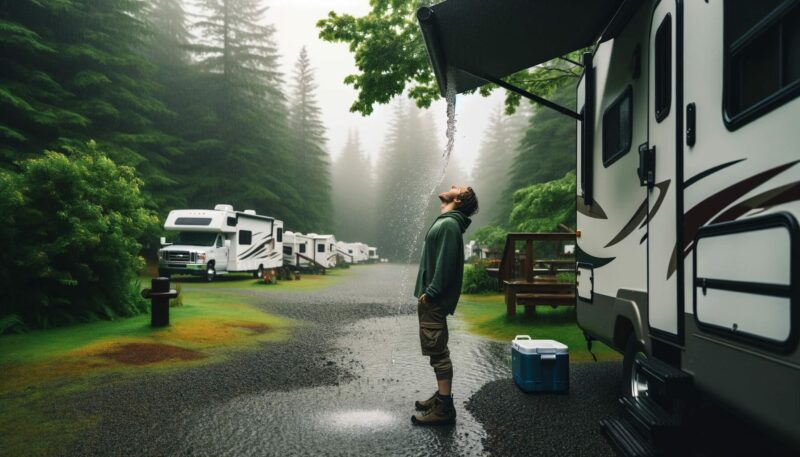Table of Contents Show
Getting drinking water while RVing can be tricky, especially if you don’t have a water source nearby. With rainwater collecting increasing in popularity recently, some owners are considering using their campers to collect water.
So, is it safe to drink rainwater from your RV gutters? The answer might surprise you.
Today, we’ll answer this question and see what you can do to ensure you only consume safe drinking water.
What Is Rainwater?
Rainwater is the liquid that forms when water vapor in the Earth’s atmosphere condenses into droplets and falls to the ground. In elementary and middle school, you likely learned about the water cycle. Water from oceans, lakes, rivers, and other sources evaporates to start the process.
From there, the water travels into the atmosphere, where it cools. This process causes tiny water droplets or ice to form. As the droplets stick together, they form clouds. If you’ve ever walked or run through fog, you’ve felt the moisture getting stuck on you.
Eventually, these droplets get too heavy and fall from the sky. When the temperatures are above freezing, it falls to the ground as rain. However, it can turn into snow or ice below freezing. Some water returns to the soil and various waterways, and the cycle continues.
Do People Drink Rainwater?
The practice of drinking water varies all over the world. While many of us are lucky enough to have clean, potable drinking water, that’s not the case for everyone. Some reports indicate that approximately two billion people, about 46% of the world’s population, don’t have access to safe drinking water. As they say, desperate times call for desperate measures.
For these two billion people, something is better than nothing. However, most of you don’t have to walk too far to get safe drinking water. As a result, drinking rainwater isn’t typically something that officials advise. Some areas have rules and regulations that prohibit it.
Before drinking or using rainwater, it’s best to check with your local authorities and research regulations. Failing to do so can land you in serious trouble. Even if it’s acceptable, they may be able to help provide you with tips for collecting and treating it.
Is Rainwater from RV Gutters Safe to Drink?
Collecting water using your RV gutters has the potential to be safe. However, you should test it beforehand to avoid any potential contamination issues. You can have more freedom if you’re not consuming the water and only using it to flush toilets. But if you use it for dishes, washing your hands, or cooking, you should confirm it’s safe.
You have to consider the gunk and debris that gets on your vehicle while it sits outside. You wash it because dirt, bird poop, and other nastiness get caked to it. The water running down your gutters will travel over the roof material, which could have who knows what on it. You could ingest dangerous bacteria that could cause health issues.
How to Safely Drink Rainwater from RV Gutters
It’ll require some effort to drink rainwater collected from your RV gutters. Let’s look at the steps you can take to ensure the water you’re consuming is clean and safe to drink.
Clean Gutters and Roof
One of the critical steps in safely drinking rainwater collected from RV gutters is to ensure the cleanliness of both the gutters and the RV roof. Start by inspecting the roof for any debris, dirt, or contaminants that may have gathered. Clean the roof thoroughly, removing leaves, twigs, and other debris that could contaminate the rainwater.
Pay special attention to areas around vents, air conditioning units, and any other potential sources of pollution. Once the roof is clean, inspect the gutters to ensure they are free from blocks and impurities.
Keep in Mind: Are you looking for the best RV sealant? Here are 10 great options!

Use a Filtration System
A reliable filtration system in your setup is crucial for drinking rainwater collected from RV gutters. A high-quality filtration system can effectively remove contaminants, particulate matter, and potential impurities from the rainwater, ensuring that it meets safe drinking standards.
Look for filtration options specifically designed for rainwater harvesting systems. They can handle the unique challenges of collecting water from various surfaces.
Standard filtration methods for rainwater include sediment filters to remove debris, carbon filters for odor and taste improvement, and UV sterilization or chlorination to disinfect the water.
Your filtration system will depend on the water quality concerns and how you’ll use the rainwater. Either way, regular maintenance and replacement of filter components are essential to ensure the system remains effective.
Have a Plan for Storage
One of the biggest issues you’ll have to deal with collecting rainwater is storing it. Once it runs down your gutters or the collection system, you’ll need a place to put it. Start by selecting a food-grade and appropriately sized storage container or tank for potable water.
Ensure that the container is clean and free of impurities before use. Properly sealed lids or covers prevent debris, insects, or other gunk from getting into it. To maintain water quality, avoid exposing the container to direct sunlight, which can promote algae growth.
Treat Rainwater
Treating rainwater is critical in ensuring its safety for drinking. Rainwater collected from rooftops can contain bacteria, so it’s essential to employ appropriate treatment methods. Common treatment options include chlorination and UV sterilization.
Chlorination involves adding a small amount of chlorine to the rainwater to kill bacteria and pathogens. UV sterilization uses ultraviolet light to disinfect the water, rendering it safe to drink.
Choose the treatment method that suits your preferences and equipment availability, but ensure it complies with local regulations and guidelines for potable water.
Pro Tip: Each campground’s water quality differs. This RV water filter will ensure you always have fresh drinkable water!
Test Quality
Testing the quality of rainwater collected from RV gutters is vital in ensuring its safety for consumption. Regular water quality testing helps identify any potential issues or contaminants that may be present in the collected rainwater.
Test kits for rainwater are readily available and can measure parameters such as pH levels, microbial contamination, and chemical impurities. It’s crucial to adhere to a testing schedule and conduct tests periodically, primarily if you rely on rainwater for drinking and cooking.
Know Local Regulations
Before relying on rainwater collected from RV gutters for drinking, it’s essential to be well-informed about local regulations and guidelines regarding rainwater harvesting and potable water standards. These regulations can vary significantly from one city or county to another. It may dictate specific requirements for collecting, treating, and using rainwater.
Some areas may have strict standards, while others may have more lenient or flexible guidelines. Understanding and complying with local regulations is crucial to ensure that your rainwater harvesting system adheres to safety and quality standards set by authorities.
To comply with local regulations, consult with local health departments or water authorities for guidance. They can provide valuable information on water quality standards, necessary permits, and recommended practices for collecting and using rainwater in your RV.
Have a Backup Source
While collecting and drinking rainwater from RV gutters can be a sustainable and cost-effective option, you should have a backup source of potable water.
Rainfall can be unpredictable, and relying solely on rainwater may leave you without a water source during dry periods or when traveling to regions with limited precipitation.
To ensure a constant supply of safe drinking water, consider carrying an additional source, such as bottled water or a portable water filtration system, when on the road. This backup source can be invaluable in emergencies or in times of insufficient rainwater collection.
Should You Drink Rainwater from Your RV Gutters?
Drinking rainwater from your RV gutters will be a lot of work and yield little results. The gutters on your rig aren’t very large, so they won’t likely collect much water.
However, if you’re in a more permanent setup, you could yield better results and create a system for your needs. Ensure you take safety seriously, especially if you plan to consume the water you collect.
Have you ever used rainwater while camping?






